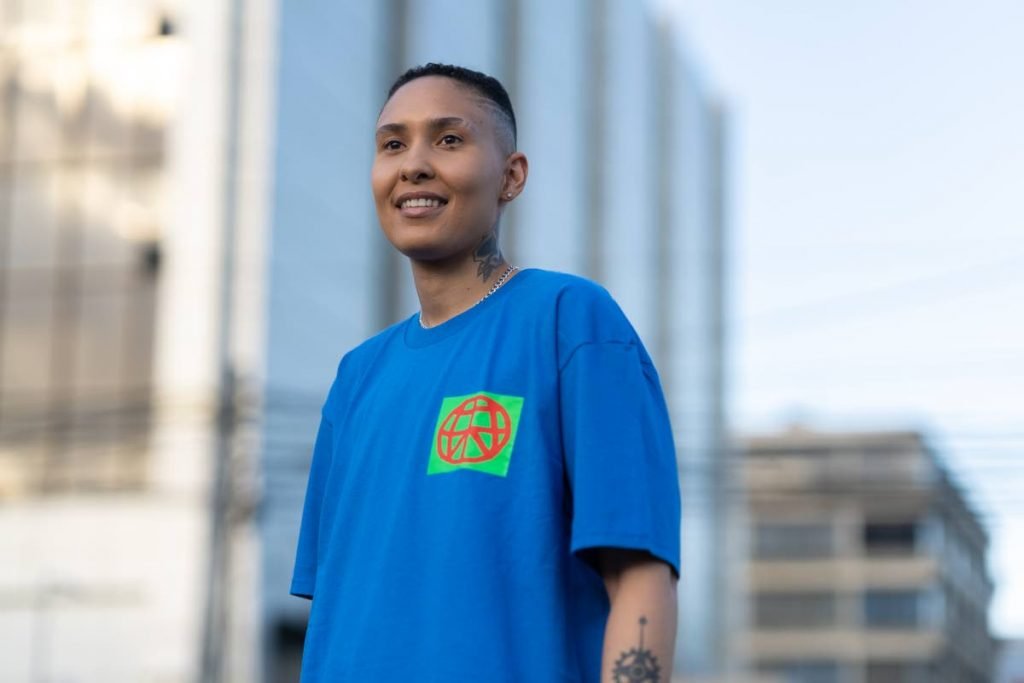Life as neither male nor female: Nel Schneider embraces non-binary identity

In the same way cisgender people are simply aware that they are girls or boys, 32-year-old Nel Schneider knows that they are neither.
According to the Oxford dictionary, a cisgender person is one whose sense of personal identity and gender is the same as their birth sex.
If they have to be labelled, Schneider considers themselves to be non-binary which, according to the Cambridge dictionary, means a person experiences their gender as both male and female, or neither male nor female.
Instead of he/him or she/her, the pronouns used are they/them.
Schneider was biologically born a female. And while it is true they never liked dresses and preferred activities society attaches to males, that had no bearing on their gender identity. It was just their first indication that they were “different.”
“It’s about identity. It’s not about the clothes you wear, it’s not about sports, or anyone liking singing or dancing. My identity is not biologically a woman, neither is it biologically a man. And I really wish I could put on paper a checklist as to what criteria one meets to exist within a space that isn’t defined as male or female but I can’t. What I can tell you is that I know myself and I know what I certainly am and what I certainly am not.”
They view gender as a spectrum and believe people can fall anywhere between male and female. People do not have to meet a specific set of societal standards of what is male or female.
“For me, the definition rests in the rejecting of a male or female gender, feeling as though you exist perhaps, somewhere in between or along the spectrum.
“Growing up it didn’t fit – being a girl. It didn’t work for me. It wasn’t in my heart. All of the different things that defined girls were not fitting for me. I never really felt very much like a girl, but never really felt very much like a boy. In our society I was never exposed to anyone or anything that showed me it was okay to embrace not feeing like either binary gender.”
From as early as age five they remembered having more masculine traits than the traditional definition of a girl. Growing up, people often called them a “tomboy” but they did not feel as if they were a girl or a boy and they did not know they could identify differently.

“The term tomboy is one that has greatly evolved over time. There was a time we did not have the language so we just used that word. One could say it evolved from tomboy to having masculine traits, to masculine presenting to not female to nonbinary.”
Although they believe testimonials can educate and raise awareness, they do not believe it is the job of people in the lesbian, gay, bisexual, transgender, queer or questioning and others (LGBTQ+) community to educate anyone else. Instead, they believe people should educate themselves or get educated on any group within their society so they could be aware and sensitive to their needs and rights.
“We are already incredibly oppressed, discriminated against, marginalised, and victims of many different hate crimes so I don’t think the responsibility of educating should fall on us.”
They said there is a lot of literature people can access on various minority communities that are marginalised but very few people are willing to broaden their minds.
“Allow people to be. It is very difficult to understand how me being nonbinary feels threatening to other people. I have never been able to understand why there may be any sort of negative responses about that.”
Understanding who they are
As Schneider grew older they realised they were not attracted to men and, at age 14, they told their mother, "I think I’m a lesbian."
When they came out as a lesbian, they lost many friends. But some stayed by their side and they made new friends.
They started to change their wardrobe from female to male and they were met with a lot of opposition from people in TT society. They did not care because the female clothing made them uncomfortable and they refused to force themselves to wear them.
When they started travelling and experiencing “more open and accepting societies,” they were exposed various new terms, including “nonbinary” and started educating themselves.
They finally had a word to describe themselves.
“It is only more recently, within the past year or so, that I have embraced the term nonbinary and rejected the she/her pronouns I was assigned at birth and chose the they/them.
“But you know what’s funny? Without me prompting them, when I was growing up, all of my family would say, ‘Nel is a girl but a boy. He, her.’ They would say these kinds of things in jest but there was a lot of truth in it. They recognised it on their own long before I chose the term nonbinary.”
Their family has always been very accepting and supportive of them.
“My family, my immediate family in particular, they have been amazing. I could not have asked for a better experience. And that goes for both sets of grandparents, my parents, aunts and uncles. I could not have asked for a more loving, open, inclusive family.”
They said their family is both religious and spiritual, but they put more importance on who people are as a person with integrity, morals so their sexuality or gender identity never divided them.
“I too am very spiritual. I pray every day. There is nothing and no one under the sun that could separate me from my relationship with God. So, I am always very upset when human beings use God as a tool to sully other human beings’ relationship with God, when they use it as a tool for their discrimination, oppression and hate. The most important thing to me is that I count on and rest on and take refuge in God’s love every single day.”
Hope for an inclusive TT
Schneider migrated to Toronto, Canada in 2018 but the move had nothing to do with any fear or discrimination in TT. They said they had no opposition because of their sexuality or gender identity.
“I didn’t run from Trinidad. I am always home. I love Trinidad and Tobago. I left TT because I couldn’t find a job, build a career, or make enough money to buy a home.

“I recognise that may not be the same for everyone else in a similar position. I do recognise my privilege. I recognise I, more or less, operate in a bubble where I ensure where I visit, where I eat, where I shop, where I play mas, all of those things are inclusive environments for me.”
They said Toronto is a different world from TT. For example, when they started their job they had to do a training course specific to the LGBTQ+ community to ensure employees were aware and educated about acceptance, the language to use, and more.
In Toronto, gay marriage is legal, there are legal rights for people in same-sex relationships, there are same-sex couples and nonbinary images in advertisements, and the country is generally more accepting of the LGBTQ+ community. And they would like to live in a place where they could get married, and have those rights recognised and celebrated.
They told Sunday Newsday they can see that individuals in TT are taking steps in a more accepting direction even though all TT has done for the community is decriminalise consensual sexual relations between adults of the same sex.
“I love my friends and family, I have a small business during Carnival, I enjoy our culture so much. Everything I am, who I am was build and made in TT. So, while we are very far behind, my faith is here and I have so much hope for our society moving forward.”
What they would like to see in TT is more supportive, open and accepting parents as they are a child’s first line of defence and support. In their experience, if they are not confident about something and they discuss the matter with their mother, if their mother approves and supports them, they feel “bulletproof” about the situation.
“For me, she (their mother) has given me an armour with which I can face society. I am strong. My strength is not only mine, but hers combined. And that is so important to us as children.”
Schneider asked that parents with LGBTQ+ children educate themselves and try to understand and support their children. They asked that parents put their child’s happiness first rather than worrying about what others would think.
“As children we need our parents’ support. We need their acceptance. We need their unconditional love. It is so important as a parent in this world that is evolving so quickly, to open your minds and force yourselves to become more educated, open your eyes to the world around you and ensure that you are your child’s first line of support, and not their first line of rejection.”
They said rejection would not change anything. It would not change their minds or their feeling. It would just leave them alone and unsupported in the world.
They added that support and open-mindedness in parents applies to all aspects in a child’s life including their choice of education, career, religion, spouse, or wardrobe.


Comments
"Life as neither male nor female: Nel Schneider embraces non-binary identity"